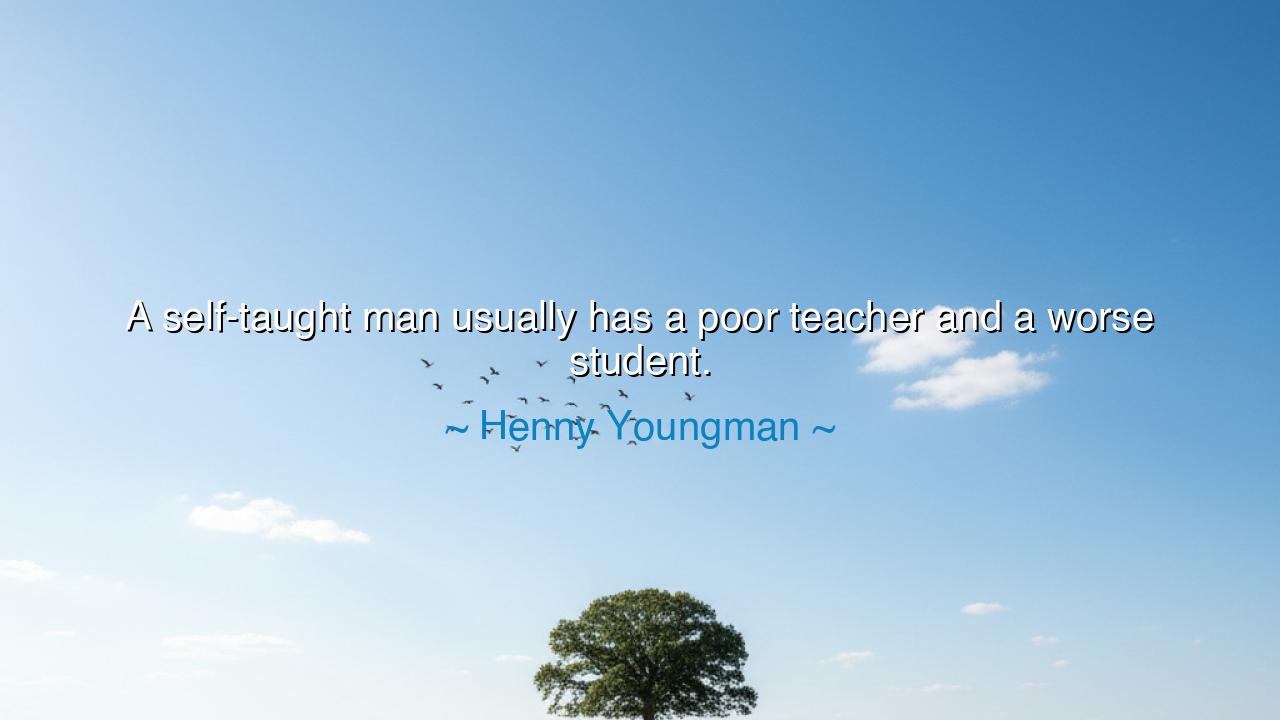
A self-taught man usually has a poor teacher and a worse






Hear the sharp and witty words of Henny Youngman: “A self-taught man usually has a poor teacher and a worse student.” Though spoken with humor, these words carry a truth forged in the experience of generations. For while the spirit of independence is noble, the path of learning without guidance is fraught with danger. The mind that teaches itself has no compass but its own, and often wanders into error. The teacher and the student within such a man are both flawed — the one too ignorant to instruct, the other too proud to listen.
The ancients spoke often of this danger. Plato warned against those who thought themselves wise without study, calling them shadows of knowledge rather than bearers of truth. In the East, Confucius declared, “When I walk with two others, both are my teachers,” reminding us that wisdom is found in humility and in learning from others. To walk the path of a self-taught man is to reject this ancient counsel, to attempt to be both master and disciple within the same mind. The result, as Youngman jested, is often folly.
Yet his words should not be taken as an attack on self-education itself, but as a caution. For history does give us exceptions. Consider Abraham Lincoln, who taught himself law by candlelight, reading borrowed books until his eyes burned. He rose from poverty to become a president who preserved a nation. Yet even Lincoln, self-taught, was shaped by mentors, debates, encounters, and the hard schooling of life. His greatness did not come from studying in isolation alone, but from allowing others — even his adversaries — to refine him. The danger is not in teaching oneself, but in refusing to be taught by others.
When Youngman calls the teacher poor and the student worse, he reminds us of human pride. To teach is to claim knowledge; to learn is to admit need. In the same soul, these roles clash. The man who teaches himself may flatter his own ignorance, failing to see his blind spots, never challenged by another’s perspective. Thus he is a poor teacher, limited by his own narrow experience. And when he learns from himself, he is a worse student, for he hears only what he wishes to hear, avoiding the discomfort that true wisdom requires.
The lesson here is humility. No one, however brilliant, is sufficient unto themselves. The mind grows sharper when struck against the stone of another’s thought. A student must submit to instruction, not only from books, but from living voices — mentors, critics, friends, even foes. Without this, learning becomes an echo chamber, where the same errors repeat endlessly. To avoid this fate, we must seek guidance, correction, and the wisdom of others.
And yet, we must not despise the spark of self-learning. It is good to read, to study, to explore beyond the classroom. But such exploration must be coupled with openness to counsel. The wise man is both self-taught and other-taught: he strives on his own, but he also listens deeply. He teaches himself through discipline, yet allows others to teach him through challenge. Thus he escapes the fate that Youngman warned against, and transforms into a true scholar of life.
Practical action lies before us: seek teachers wherever you walk. Learn from books, yes, but also from conversations, from mistakes, from the examples of those who walked before you. Do not be content to be your own teacher alone, lest you become your own worst student. Instead, balance independence with humility, courage with receptivity. For wisdom is not a solitary possession but a shared treasure, passed down like fire from torch to torch.
So let Henny Youngman’s words echo as both humor and warning: “A self-taught man usually has a poor teacher and a worse student.” Laugh at the jest, but heed the truth. Do not try to be both master and pupil in the silence of pride. Seek guidance, honor correction, and let yourself be shaped by others — for in this way, the iron of your mind will be tempered by many hammers, and the flame of wisdom will burn ever brighter.






AAdministratorAdministrator
Welcome, honored guests. Please leave a comment, we will respond soon